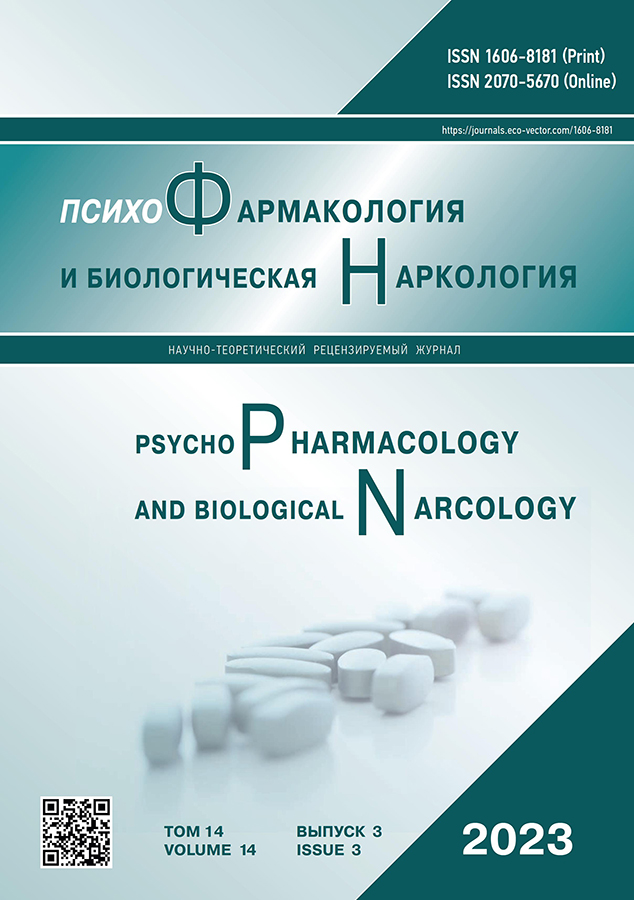The use of Cytoflavin in the post-withdrawal period in patients with alcohol dependence
- Authors: Vostrikov V.V.1
-
Affiliations:
- Kirov Military Medical Academy
- Issue: Vol 14, No 3 (2023)
- Pages: 193-201
- Section: Клиническая наркология
- Submitted: 03.08.2023
- Accepted: 03.08.2023
- Published: 11.10.2023
- URL: https://journals.eco-vector.com/1606-8181/article/view/567969
- DOI: https://doi.org/10.17816/phbn567969
- ID: 567969
Cite item
Abstract
BACKGROUND: The issues of therapy of dependence on psychoactive substances remain relevant at present, focusing on the prevention, treatment, and rehabilitation of these patients in the first place.
AIM: To evaluate the effectiveness of a course of Cytoflavin in patients with alcohol dependency during the post-abstinence period.
MATERIALS AND METHODS: An open, double-blind, placebo-controlled clinical study of the antioxidant Cytoflavin (10 mL/day, 5 days) effectiveness to correct emotional and motivational disorders after the treatment of alcohol withdrawal syndrome was performed in 30 patients with alcohol dependency. Anamnestic information, the clinical picture of the disease, and psychological tests — the Holmes and Rage method (the degree of stress tolerance and social adaptation) and alcohol consumption motivation test (ACMT) — were used to verify alcohol dependency. Before and after Cytoflavin treatment, the psychological indicators and complaints were recorded. According to the alcohol intake questionnaire, the psychological state of the patients was assessed based on a package of standard psychological tests, including the Wasserman test (level of neuroticism), Spielberger test (level of anxiety), Hamilton test (level of depression), SAN test (self-assessment of well-being, activity, and mood), and degree of craving for alcohol. For pairwise conjugated variants, the significance of differences was determined using the Student’s t-test; statistical analysis was performed using the standard Statistica for Windows software package.
RESULTS: In general, the course use of Cytoflavin treatment improved clinical and psychological parameters in patients with alcohol dependency in the post-abstinence period.
CONCLUSION: It is concluded that the use of the drug as a component of a comprehensive therapeutic program for alcohol dependency is highly promising.
Full Text
About the authors
Viktor V. Vostrikov
Kirov Military Medical Academy
Author for correspondence.
Email: viktorsvarog1957@yandex.ru
cand. sci. (pharmacology), lecturer, departament of pharmacology
Russian Federation, 6, Akademika Lebedeva str., Saint Petersburg, 194044References
- Shabanov PD. Osnovy narkologii. Saint Petersburg: Lan’; 2002. 560 p. (In Russ.)
- Vostrikov VV, Vostrikov MV, Shishlyanikov GZ, et al. Emotsional’no-motivatsionnyi status bol’nykh s alkogol’noi zavisimost’yu v postabstinentnom periode. In: Jubilee Russian Scientific Conference dedicated to the 175th anniversary of S.P. Botkin. Saint Petersburg; 2007. P. 328. (In Russ.)
- Vostrikov VV, Shishlyanikov GZ, Vostrikov MV, et al. Primenenie korteksina u bol’nykh s alkogol’noi zavisimost’yu. In: All-Russian conference dedicated to the 100th anniversaryof the V.M. Bekhterev Institute of Psychoneurology. Saint Petersburg; 2008. P. 107–108. (In Russ.)
- Spravochnik Vidal’. Lekarstvennye preparaty v Rossii: spravochnik. Moscow: AstraFarmServis; 2008. 1696 p. (In Russ.)
- Afanas’ev VV. Tsitoflavin v intensivnoi terapii: posobie dlya vrachei. Saint Petersburg; 2005. 50 p. (In Russ.)
- Livanov GA, Batotsyrenova KhV, Glushkov SI, et al. Ispol’zovanie metabolicheskogo antigipoksanta Tsitoflavina pri korrektsii gipoksii i ee posledstvii pri tyazhelykh formakh ostrykh otravlenii neirotropnymi yadami. Vestnik intensivnoi terapii. 2005:(1):60–63. (In Russ.)
- Raigorodskii DYa. Prakticheskaya psikhodiagnostika (metodiki i testy): ucheb. posobie. Samara: BAKhRAKh; 1998. 672 p. (In Russ.)
- Zav’yalov VYu. Motivatsii potrebleniya alkogolya. Moscow; 1988. (In Russ.)
- Krupitskii EM, Rudenko AA, Tsoi MV, et al. fenomenologiya patologicheskogo vlecheniya k alkogolyu u bol’nykh alkogolizmom v remissii: svyaz’ s retsidivom zabolevaniya. Uchenye zapiski SPbGMU im. akad. I.P. Pavlova. 2003;10(2):30–33. (In Russ.) doi: 10.31363/2313-7053-2022-4-63-76
- Urbakh VYu. Matematicheskaya statistika dlya biologov i medikov. Moscow; 1964. (In Russ.)
- Tyurin YuN., Makarov AA. Statisticheskii analiz dannykh na komp’yutere. Ed. by V.E. Figurnova. Moscow: INFRA-M; 1998. 528 p. (In Russ.)
Supplementary files











